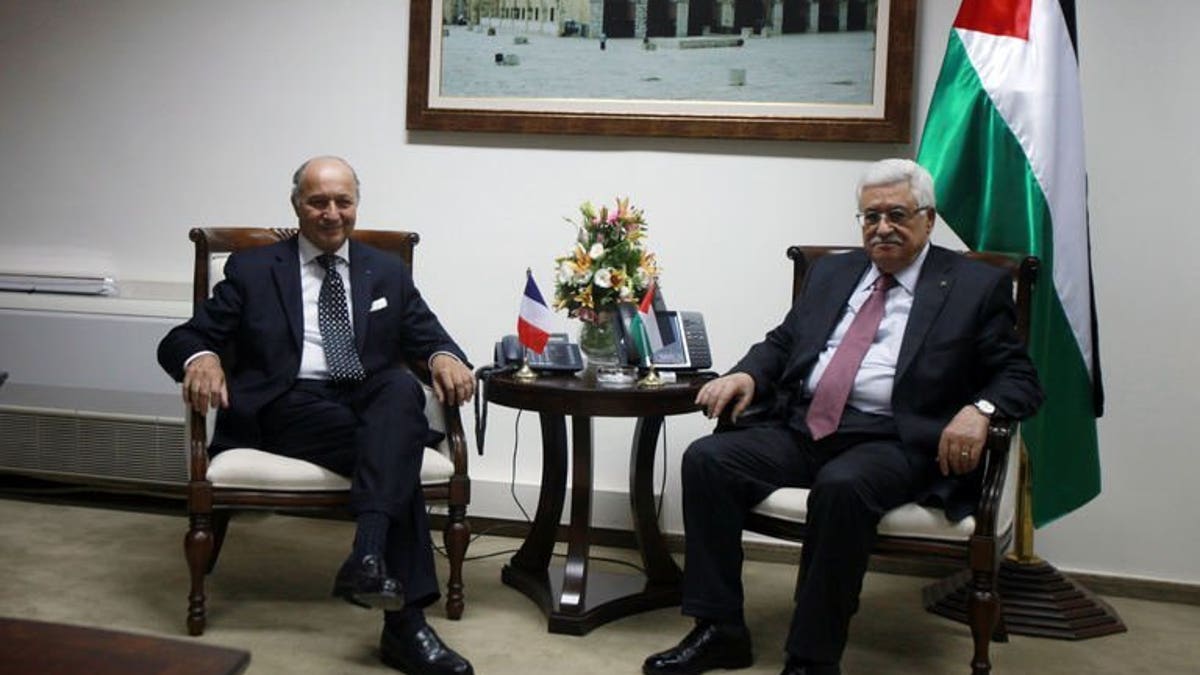
French Foreign Minister Laurent Fabius meets with Palestinian President Mahmud Abbas (R) on August 24, 2013 in the West Bank city of Ramallah. A successful outcome to the US-brokered negotiations between Israel and the Palestinians would be like a "thunderbolt" for peace in the crisis-ridden Middle East, French Foreign Minister Laurent Fabius said Saturday. (AFP)
RAMALLAH, Palestinian Territories (AFP) – A successful outcome to the US-brokered negotiations between Israel and the Palestinians would be like a "thunderbolt" for peace in the crisis-ridden Middle East, French Foreign Minister Laurent Fabius said Saturday.
"Even if we speak of other neighbouring countries -- the dramatic conflict in Syria, Lebanon, Egypt -- the fact remains that the Israeli-Palestinian issue is one of the issues, perhaps the central one, for the region," he said in the West Bank city of Ramallah, after meeting Palestinian president Mahmud Abbas.
"In a particularly troubled regional environment, it is even more important that we advance towards peace here," Fabius said.
"If these negotiations are successful, it will be a thunderbolt for peace...a great stabilising element."
"Our support is more necessary than ever," he added. "This is the moment when we must make a breakthrough for peace."
Israeli and Palestinian negotiators formally resumed direct peace talks earlier this month after a hiatus of nearly three years, thanks to an intense bout of shuttle diplomacy by US Secretary of State John Kerry.
They are expected to last about nine months.
Speaking in Amman on Saturday after talks with chief Palestinian negotiator Saeb Erakat, Jordanian Foreign Minister Nasser Judeh said he expected the next round to take place "in a few days from now."
"On all sides, particularly that of the United States, there are elements which are serious and encouraging regarding the success of the negotiations," official Jordanian news agency Petra quoted him as saying.
Palestinian sources, speaking on condition of anonymity, say they expect the talks to be held early next week in the West Bank town of Jericho.
Fabius arrived early Saturday on a visit to Israel and the Palestinian territories aimed at encouraging the sides.
Speaking at a joint press conference with the visitor, Abbas said that his team entered the talks, about which no details have so far been revealed, in good faith.
"I should like to say that the Palestinians are negotiating with good intentions," he said. "We want to negotiate in a positive spirit."
"We hope that it is the same on the Israeli side, we want to create the proper climate for stopping settlement, which is illegal to us and to the world."
The talks have been overshadowed by Israeli plans to build more than 2,000 new homes for Jewish settlers on occupied Palestinian territory.
Fabius will meet in Jerusalem on Sunday with President Shimon Peres, Prime Minister Benjamin Netanyahu and Justice Minister Tzipi Livni, Israel's lead negotiator in the talks.
The Palestinians said Friday they have "serious doubts" about Israel's commitment to the peace talks, but they remain committed to taking part in the negotiations.
"We do not have high expectations of the negotiations so far because we know in advance the official position of the Israeli government," foreign minister Riyad al-Malki said on visit to Quito, Ecuador.
